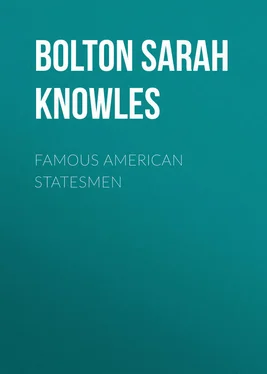Sarah Bolton - Famous American Statesmen
Здесь есть возможность читать онлайн «Sarah Bolton - Famous American Statesmen» — ознакомительный отрывок электронной книги совершенно бесплатно, а после прочтения отрывка купить полную версию. В некоторых случаях можно слушать аудио, скачать через торрент в формате fb2 и присутствует краткое содержание. ISBN: , Жанр: foreign_prose, foreign_antique, foreign_language, на английском языке. Описание произведения, (предисловие) а так же отзывы посетителей доступны на портале библиотеки ЛибКат.
- Название:Famous American Statesmen
- Автор:
- Жанр:
- Год:неизвестен
- ISBN:http://www.gutenberg.org/ebooks/39012
- Рейтинг книги:5 / 5. Голосов: 1
-
Избранное:Добавить в избранное
- Отзывы:
-
Ваша оценка:
- 100
- 1
- 2
- 3
- 4
- 5
Famous American Statesmen: краткое содержание, описание и аннотация
Предлагаем к чтению аннотацию, описание, краткое содержание или предисловие (зависит от того, что написал сам автор книги «Famous American Statesmen»). Если вы не нашли необходимую информацию о книге — напишите в комментариях, мы постараемся отыскать её.
Famous American Statesmen — читать онлайн ознакомительный отрывок
Ниже представлен текст книги, разбитый по страницам. Система сохранения места последней прочитанной страницы, позволяет с удобством читать онлайн бесплатно книгу «Famous American Statesmen», без необходимости каждый раз заново искать на чём Вы остановились. Поставьте закладку, и сможете в любой момент перейти на страницу, на которой закончили чтение.
Интервал:
Закладка:
The Continental Army soon repaired to New York. Washington spared no pains to keep a high moral standard among his men. He said, in one of his orders: "The general is sorry to be informed that the foolish and wicked practice of profane cursing and swearing – a vice heretofore little known in an American army – is growing into fashion. He hopes the officers will, by example as well as influence, endeavor to check it, and that both they and the men will reflect that we can have little hope of the blessing of Heaven on our arms if we insult it by our impiety and folly. Added to this, it is a vice so mean and low, without any temptation, that every man of sense and character detests and despises it." Noble words!
Great Britain now realized that the fight must be in earnest, and hired twenty thousand Hessians to help subjugate the colonies. When Admiral Howe came over from England, he tried to talk about peace with "Mr." Washington, or "George Washington, Esq.," as it was deemed beneath his dignity to acknowledge that the "rebels" had a general. The Americans could not talk about peace, with such treatment.
Soon the first desperate battle was fought, on Long Island, August 27, 1776, partly on the ground now occupied by Greenwood Cemetery, between eight thousand Americans and more than twice their number of trained Hessians. Washington, from an eminence, watched the terrible conflict, wringing his hands, and exclaiming, "What brave fellows I must this day lose!"
The Americans were defeated, with great loss. Washington could no longer hold New York with his inadequate forces. With great energy and promptness he gathered all the boats possible, and then, so secretly that even his aides did not know his intention, nine thousand men, horses, and provisions, were ferried over the East River. A heavy fog hung over the Brooklyn side, as though provided by Providence, while it was clear on the New York side, so that the men could form in line. Washington crossed in the last boat, having been for forty-eight hours without sleep.
In the morning, the astonished Englishmen learned that the prize had escaped. A Tory woman, the night before, seeing that the Americans were crossing the river, sent her colored servant to notify the British. A Hessian sentinel, not understanding the servant, locked him up till morning, when, upon the arrival of an officer, his errand was known; but the knowledge came too late!
On October 28, the Americans were again defeated, at White Plains, Howe beginning the engagement. The condition of the Continental Army was disheartening. They were half-fed and half-clothed; the "ragged rebels," the British called them. There was sickness in the camp, and many were deserting. Washington said, "Men just dragged from the tender scenes of domestic life, unaccustomed to the din of arms, totally unacquainted with every kind of military skill, are timid, and ready to fly from their own shadows. Besides, the sudden change in their manner of living brings on an unconquerable desire to return to their homes." So great-hearted was the commander-in-chief, though on the field of battle he had no leniency toward cowards.
Washington retreated across New Jersey to Trenton. When he reached the Delaware River, filled with floating ice, he collected all the boats within seventy miles, and transported the troops, crossing last himself. Lord Cornwallis, of Howe's army, came in full pursuit, reached the river just as the last boat crossed, and looked in vain for means of transportation. There was nothing to be done but to wait till the river was frozen, so that the troops could cross on the ice.
Washington, December 20, 1776, told John Hancock, President of Congress, "Ten days more will put an end to the existence of our army." Yet, on the night of December 25, Christmas, with almost superhuman courage, he determined to recross the Delaware, and attack the Hessians at Trenton. The weather was intensely cold. The boats, in crossing, were forced out of their course by the drifting ice. Two men were frozen to death. At four in the morning, the heroic troops took up the line of march, the snow and sleet beating in their faces. Many of the muskets were wet and useless. "What is to be done?" asked the men. "Push on, and use the bayonet," was the answer.
At eight in the morning, the Americans rushed into the town. "The enemy! the enemy!" cried the Hessians. Their leader, Colonel Rahl, fell, mortally wounded. A thousand men laid down their arms and begged for quarter. Washington recrossed the Delaware with his whole body of captives, and the American nation took heart once more. That fearful crossing of the Delaware, in the blinding storm, and the sudden yet marvellous victory which followed, will always live among the most pathetic and stirring scenes of the Revolution. A few days later, January 3, 1777, with five thousand men, Washington defeated Cornwallis at Princeton, exposing himself so constantly to danger that his officers begged him to seek a place of safety.
The third year of the Revolutionary War had opened. France, hating England, sympathizing with America in her struggle for liberty, and being encouraged in this sympathy by the honored Benjamin Franklin, loaned us money, supplied muskets and powder, and many troops under such brave leaders as Lafayette and De Kalb. The year 1777, although our forces were defeated at Brandywine and Germantown, witnessed the defeat of a part of Burgoyne's army at Bennington, Vermont, and, on the 17th of October, the remaining part at Saratoga; over five thousand men, seven thousand muskets, and a great quantity of military stores. Two months later, France made a treaty of alliance with the United States, to the joy of the whole country.
On December 11, Washington went into winter-quarters at Valley Forge, on the west side of the Schuylkill, about twenty miles from Philadelphia. Trees were felled to build huts, the men toiling with scanty food, often barefoot, the snow showing the marks of their bleeding feet. Continental money had so depreciated that forty dollars were scarcely equal in value to one silver dollar. Sickness was decreasing the forces. Washington wrote to Congress: "No less than two thousand eight hundred and ninety-eight men are now in camp unfit for duty, because they are barefoot and otherwise naked." From lack of blankets, he said, "numbers have been obliged, and still are, to sit up all night by fires, instead of taking comfortable rest in a natural and common way." A man less great would have been discouraged, but he trusted in a power higher than himself, and waited in sublime dignity and patience for the progress of events. Martha Washington had come to Valley Forge to share in its privations, and to minister to the sick and the dying.
The years 1778 and 1779 dragged on with their victories and defeats. The next year, 1780, the country was shocked by the treason of Benedict Arnold, who, having obtained command at West Point, had agreed to surrender it to the British for fifty thousand dollars in money and the position of brigadier-general in their army. On September 21, Sir Henry Clinton sent Major John André, an adjutant-general, to meet Arnold. He went ashore from the ship Vulture, met Arnold in a wood, and completed the plan. When he went back to the boat, he found that a battery had driven her down the river, and he must return by land. At Tarrytown, on the Hudson, he was met by three militiamen, John Paulding, David Williams, and Isaac Van Wart, who at once arrested him, and found the treasonable papers in his boots. He offered to buy his release, but Paulding assured him that fifty thousand dollars would be no temptation.
André was at once taken to prison. While there he won all hearts by his intelligence and his cheerful, manly nature. He had entered the British army by reason of a disappointment in love. The father of the young lady had interfered, and she had become the second wife of the father of Maria Edgeworth. André always wore above his heart a miniature of Honora Sneyd, painted by herself. Just before his execution as a spy, he wrote to Washington, asking to be shot. When he was led to the gallows, October 2, 1780, and saw that he was to be hanged, for a moment he seemed startled, and exclaimed, "How hard is my fate!" but added, "It will soon be over." He put the noose about his own neck, tied the handkerchief over his eyes, and, when asked if he wished to speak, said only: "I pray you to bear witness that I meet my fate like a brave man." His death was universally lamented. In 1821, his body was removed to London by the British consul, and buried in Westminster Abbey.
Читать дальшеИнтервал:
Закладка:
Похожие книги на «Famous American Statesmen»
Представляем Вашему вниманию похожие книги на «Famous American Statesmen» списком для выбора. Мы отобрали схожую по названию и смыслу литературу в надежде предоставить читателям больше вариантов отыскать новые, интересные, ещё непрочитанные произведения.
Обсуждение, отзывы о книге «Famous American Statesmen» и просто собственные мнения читателей. Оставьте ваши комментарии, напишите, что Вы думаете о произведении, его смысле или главных героях. Укажите что конкретно понравилось, а что нет, и почему Вы так считаете.












